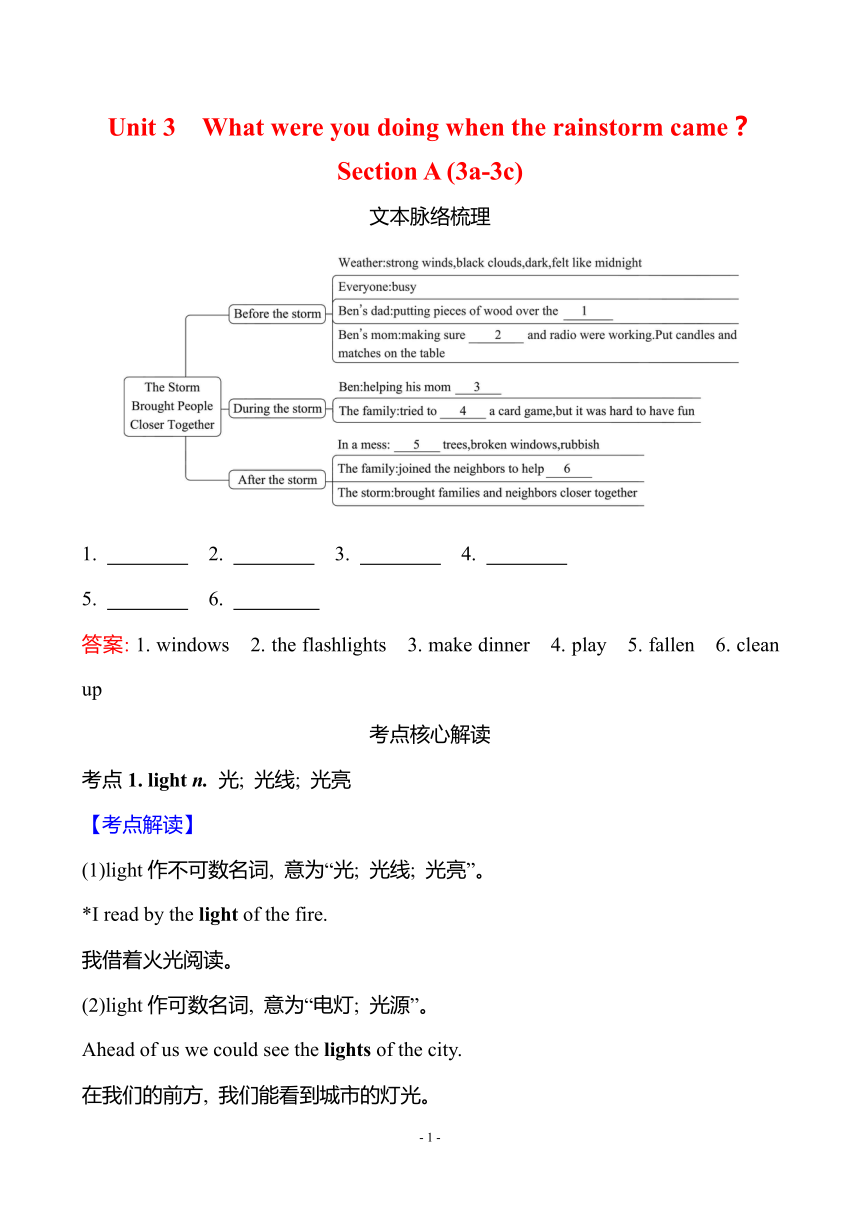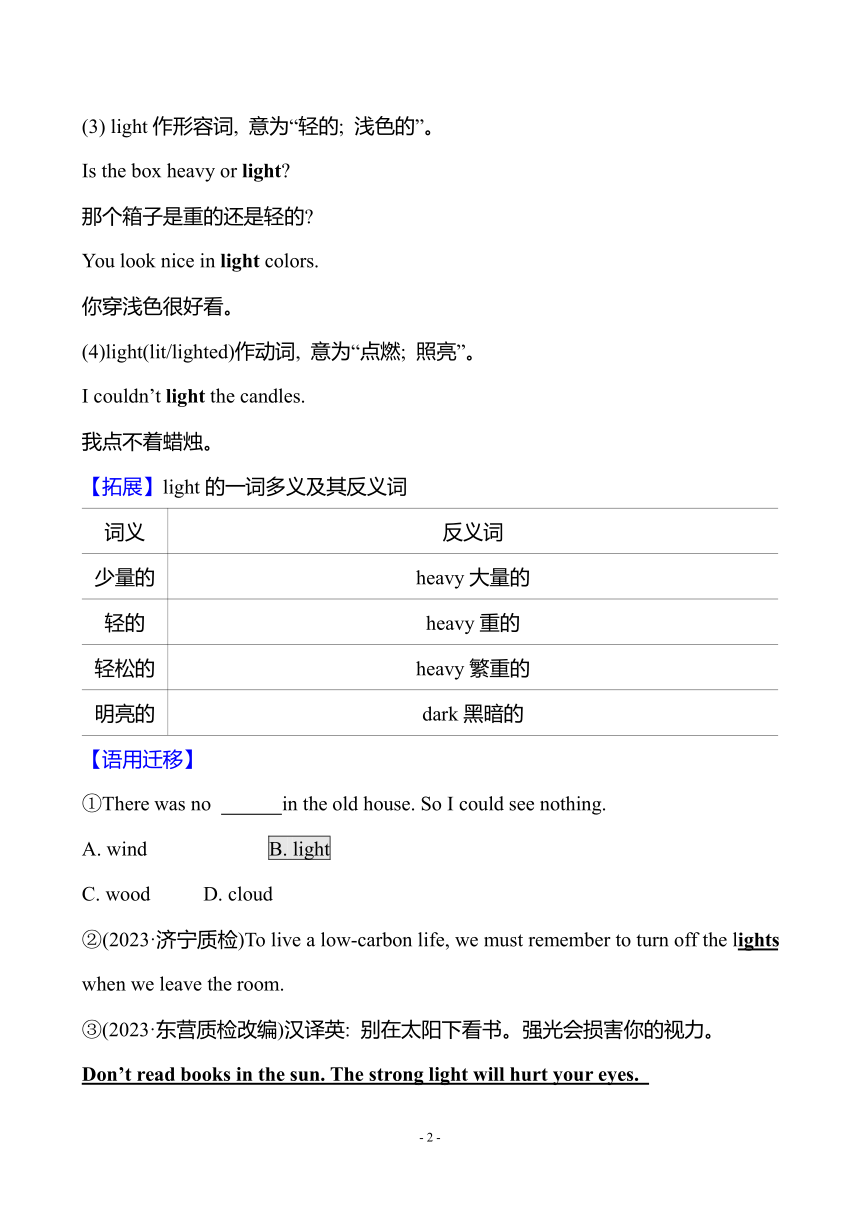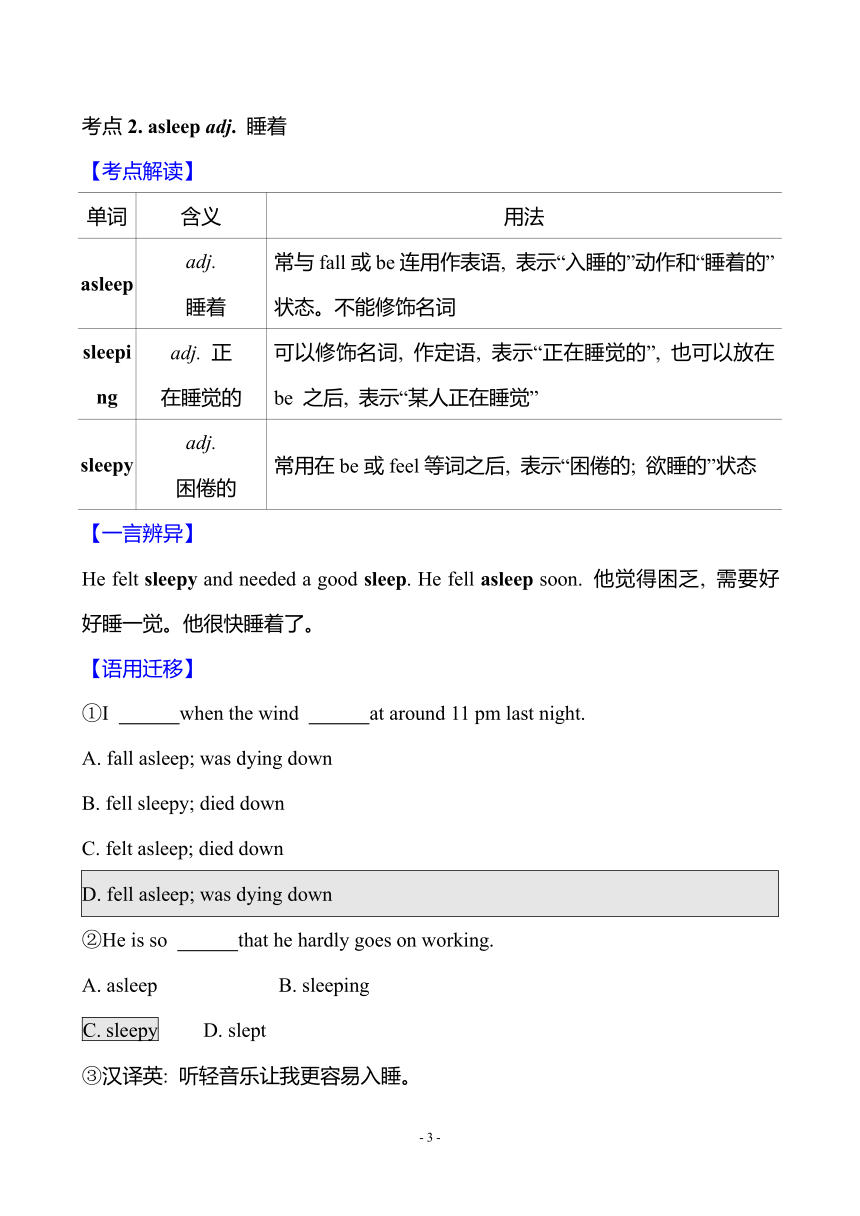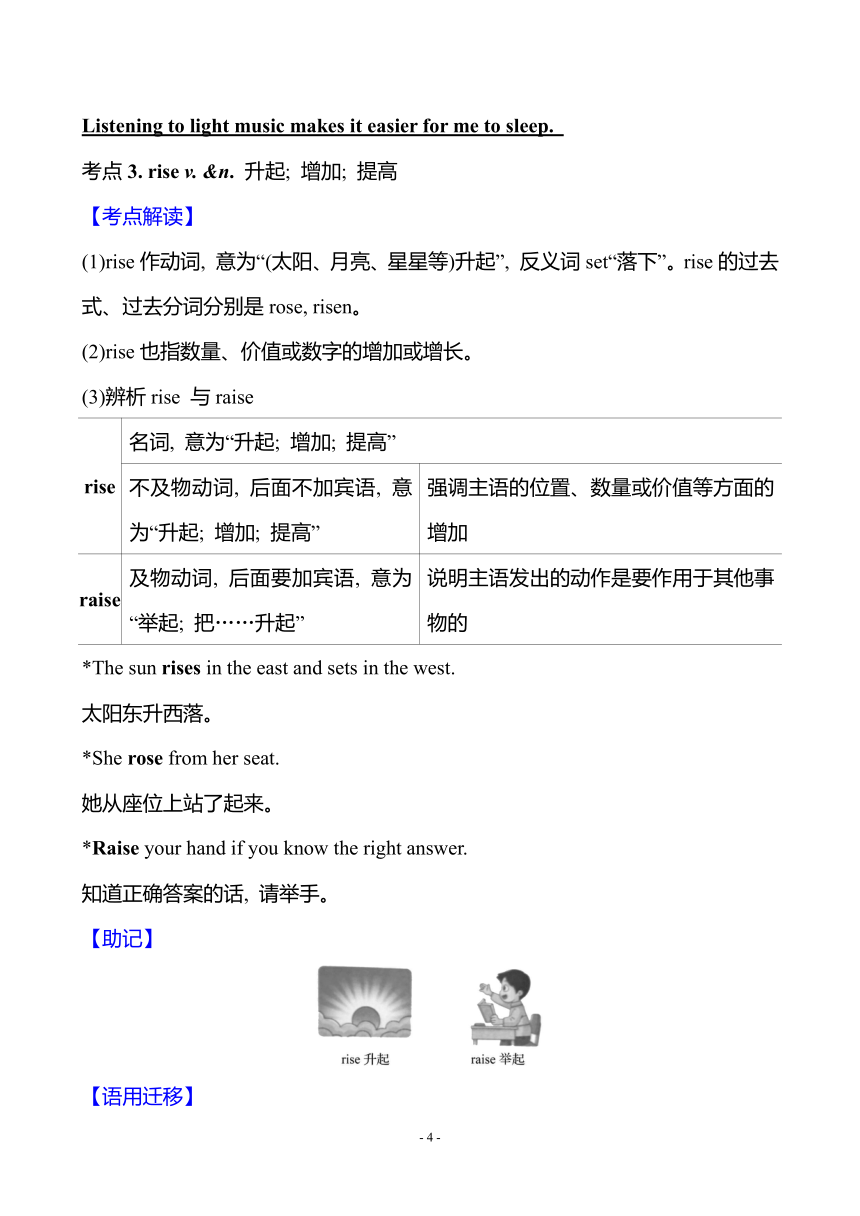Unit 3 What were you doing when the rainstorm came? Section A (3a-3c) 学案(含答案) 2024-2025学年英语鲁教版八年级上册
文档属性
| 名称 | Unit 3 What were you doing when the rainstorm came? Section A (3a-3c) 学案(含答案) 2024-2025学年英语鲁教版八年级上册 |

|
|
| 格式 | docx | ||
| 文件大小 | 190.1KB | ||
| 资源类型 | 教案 | ||
| 版本资源 | 鲁教版 | ||
| 科目 | 英语 | ||
| 更新时间 | 2024-06-13 15:05:46 | ||
图片预览




文档简介
Unit 3 What were you doing when the rainstorm came?
Section A (3a-3c)
文本脉络梳理
1. 2. 3. 4.
5. 6.
答案: 1. windows 2. the flashlights 3. make dinner 4. play 5. fallen 6. clean up
考点核心解读
考点1. light n. 光; 光线; 光亮
【考点解读】
(1)light作不可数名词, 意为“光; 光线; 光亮”。
*I read by the light of the fire.
我借着火光阅读。
(2)light作可数名词, 意为“电灯; 光源”。
Ahead of us we could see the lights of the city.
在我们的前方, 我们能看到城市的灯光。
(3) light作形容词, 意为“轻的; 浅色的”。
Is the box heavy or light
那个箱子是重的还是轻的
You look nice in light colors.
你穿浅色很好看。
(4)light(lit/lighted)作动词, 意为“点燃; 照亮”。
I couldn’t light the candles.
我点不着蜡烛。
【拓展】light的一词多义及其反义词
词义 反义词
少量的 heavy大量的
轻的 heavy重的
轻松的 heavy繁重的
明亮的 dark黑暗的
【语用迁移】
①There was no in the old house. So I could see nothing.
A. wind B. light
C. wood D. cloud
②(2023·济宁质检)To live a low-carbon life, we must remember to turn off the lights when we leave the room.
③(2023·东营质检改编)汉译英: 别在太阳下看书。强光会损害你的视力。
Don’t read books in the sun. The strong light will hurt your eyes.
考点2. asleep adj. 睡着
【考点解读】
单词 含义 用法
asleep adj. 睡着 常与fall或be连用作表语, 表示“入睡的”动作和“睡着的”状态。不能修饰名词
sleeping adj. 正 在睡觉的 可以修饰名词, 作定语, 表示“正在睡觉的”, 也可以放在be 之后, 表示“某人正在睡觉”
sleepy adj. 困倦的 常用在be或feel等词之后, 表示“困倦的; 欲睡的”状态
【一言辨异】
He felt sleepy and needed a good sleep. He fell asleep soon. 他觉得困乏, 需要好好睡一觉。他很快睡着了。
【语用迁移】
①I when the wind at around 11 pm last night.
A. fall asleep; was dying down
B. fell sleepy; died down
C. felt asleep; died down
D. fell asleep; was dying down
②He is so that he hardly goes on working.
A. asleep B. sleeping
C. sleepy D. slept
③汉译英: 听轻音乐让我更容易入睡。
Listening to light music makes it easier for me to sleep.
考点3. rise v. &n. 升起; 增加; 提高
【考点解读】
(1)rise作动词, 意为“(太阳、月亮、星星等)升起”, 反义词set“落下”。rise的过去式、过去分词分别是rose, risen。
(2)rise也指数量、价值或数字的增加或增长。
(3)辨析rise 与raise
rise 名词, 意为“升起; 增加; 提高”
不及物动词, 后面不加宾语, 意为“升起; 增加; 提高” 强调主语的位置、数量或价值等方面的增加
raise 及物动词, 后面要加宾语, 意为“举起; 把……升起” 说明主语发出的动作是要作用于其他事物的
*The sun rises in the east and sets in the west.
太阳东升西落。
*She rose from her seat.
她从座位上站了起来。
*Raise your hand if you know the right answer.
知道正确答案的话, 请举手。
【助记】
【语用迁移】
①—I asked for a pay and my boss agreed.
—Good for you!
A. rise B. repeat C. reason D. report
②If you have questions to ask in class, please your hand.
A. raise B. rise C. shake D. wash
③汉译英: 她突然间提高了嗓门。
Her voice rose suddenly.
课时分层演练
【A层 基础练】
Ⅰ. 根据句意及首字母或汉语提示完成单词
1. If you feel cold, you can close the door and window(s).
2. My brother is watching TV. The weather report says there will be rain in the South China tomorrow.
3. Our team worked so hard that we beat(打败) the strongest team in this match.
4. Nothing can make us apart(分开).
5. The woman stands against (倚) the door and just looks like a stick.
Ⅱ. 用所给词的适当形式填空
1. After the strong wind, fallen(fall)leaves were everywhere.
2. I have a toothache these days. I don’t feel like eating (eat)anything.
3. The wind(windy) blows very strongly outside.
4. Now people don’t often use matches(match) to make a fire.
5. Tom was too tired and he fell asleep(sleep)quickly.
Ⅲ. 完成句子
1. 过了一会儿, 风开始减弱。
After a while, the wind began to die down.
2. 21世纪把城市和乡村拉得更近了。
The twenty-first century has brought the city and the country closer together.
3. 当玛丽离开房间的时候, 我正在弹钢琴。
I was playing the piano when Mary left the room.
4. 你可以把搅拌器拆开来清洁。
You can take the mixer apart to clean it.
5. 雨水拍打在窗户上。
The rain beat against the windows.
【B层 能力练】
Ⅳ. 完形填空
(2022·武汉中考改编)
The December day started like any other. Papa came back with his boat full of fish. Mama made breakfast for the family. Seven-year-old Joonas was doing his homework, while his two little brothers ran around the yard. That day seemed peaceful, but Alejo 1 better.
Alejo felt shaking in his legs, and his ears perked up (竖着), listening for what had already 2 . Alejo made a crying sound, and Mama said, “Sh! ” Alejo barked (吠), and Joonas complained, “Quiet! I’m trying to 3 . ”
Suddenly, a strange roaring (轰鸣) sound began. Papa ran to a nearby building’s roof to 4 what was happening. But Alejo knew better. The shaking of the ground traveled up his padded paws (肉掌). He wanted to run, but he didn’t dare to leave his family.
“Why were they 5 Didn’t they know that a great earthquake had roared under the ocean and would soon bring strong waves onto the land ” Alejo thought.
And then Papa shouted with fear from the rooftop, “Tsunami(海啸)! Run! ”
Mama cried, “Sons, come on! ” She grabbed (抓) a little one under each arm. “Joonas, run! You’re fast and strong. Follow me up the 6 . Fast! ”
But the roar had got louder, 7 her words. All that Joonas had heard was, “Run! ” And he ran back home where he thought he would be 8 . Alejo barked and barked, but the tsunami made it hard to hear his voice, too.
Alejo gently bit (咬) Joonas’ feet, but the boy wouldn’t move. “Go, ” Joonas pushed the dog away, but Alejo would not give up. He grabbed Joonas’ shirt in his 9 . He pulled and pulled until his mouth broke. With all his strength, he pulled Joonas back outside and hit him from behind. Finally, the boy understood.
Alejo ran toward the hill, looking back to make sure Joonas was following. They raced uphill as the huge wall of 10 ran after them. Alejo and Joonas didn’t stop running until they reached higher up the hill and met their family. And they had a mother-father-brothers-dog thankful hug.
1. A. knew B. grew C. felt D. became
2. A. returned B. movedC. started D. stopped
3. A. sleep B. speakC. think D. listen
4. A. deal with B. find out C. worry about D. look through
5. A. cooking B. waiting C. playing D. complaining
6. A. hill B. roof C. boat D. land
7. A. passing on B. cutting offC. breaking down D. leaving out
8. A. warm B. brave C. safe D. free
9. A. feet B. paws C. teeth D. legs
10. A. wood B. sand C. stone D. water
Ⅴ. 选词并用其适当形式填空
(2023·泰安质检)
event worry heavy sudden cheer begin tower light cause candle
Everything went black! All the 1. lights in our flat went out, including the TV. Mum took out the candles and Dad went to see what was going on. One advantage (好处) of living in a tall building is that you always have help nearby. So I went to our next-door neighbour, Mr Smith. With a 2. candle in his hand, Mr Smith answered the door. Uh-oh! He didn’t have lights, either. I found that all the buildings in our neighbourhood were dark. Our neighbours went downstairs and 3. began chatting(聊天) outside. They were not 4. worried at all.
Then we heard a scary sound after a bright flash of lightning. It started to rain 5. heavily in no time. In order to get some information, Mr Smith turned on the radio. The weatherman said that the storm was the 6. cause of all the problems. It hit a 7. tower at the power (电) station before the frost flash of lightning. That was the reason why the lights 8. suddenly went out before the rain came. Finally, the lights came back. We 9. cheered loudly. The 10. event made it possible for the neighbours to have a chance to be together.
【词汇积累】
roof /ru f/ n. 屋顶; 车顶; 顶部 vt. 给……盖顶; 盖上屋顶
chat /t t/ vi. 聊天n. 聊天
power / pa (r)/ n. 权力; 功率; 能; 能力; 力; 电力供应
- 9 -
Section A (3a-3c)
文本脉络梳理
1. 2. 3. 4.
5. 6.
答案: 1. windows 2. the flashlights 3. make dinner 4. play 5. fallen 6. clean up
考点核心解读
考点1. light n. 光; 光线; 光亮
【考点解读】
(1)light作不可数名词, 意为“光; 光线; 光亮”。
*I read by the light of the fire.
我借着火光阅读。
(2)light作可数名词, 意为“电灯; 光源”。
Ahead of us we could see the lights of the city.
在我们的前方, 我们能看到城市的灯光。
(3) light作形容词, 意为“轻的; 浅色的”。
Is the box heavy or light
那个箱子是重的还是轻的
You look nice in light colors.
你穿浅色很好看。
(4)light(lit/lighted)作动词, 意为“点燃; 照亮”。
I couldn’t light the candles.
我点不着蜡烛。
【拓展】light的一词多义及其反义词
词义 反义词
少量的 heavy大量的
轻的 heavy重的
轻松的 heavy繁重的
明亮的 dark黑暗的
【语用迁移】
①There was no in the old house. So I could see nothing.
A. wind B. light
C. wood D. cloud
②(2023·济宁质检)To live a low-carbon life, we must remember to turn off the lights when we leave the room.
③(2023·东营质检改编)汉译英: 别在太阳下看书。强光会损害你的视力。
Don’t read books in the sun. The strong light will hurt your eyes.
考点2. asleep adj. 睡着
【考点解读】
单词 含义 用法
asleep adj. 睡着 常与fall或be连用作表语, 表示“入睡的”动作和“睡着的”状态。不能修饰名词
sleeping adj. 正 在睡觉的 可以修饰名词, 作定语, 表示“正在睡觉的”, 也可以放在be 之后, 表示“某人正在睡觉”
sleepy adj. 困倦的 常用在be或feel等词之后, 表示“困倦的; 欲睡的”状态
【一言辨异】
He felt sleepy and needed a good sleep. He fell asleep soon. 他觉得困乏, 需要好好睡一觉。他很快睡着了。
【语用迁移】
①I when the wind at around 11 pm last night.
A. fall asleep; was dying down
B. fell sleepy; died down
C. felt asleep; died down
D. fell asleep; was dying down
②He is so that he hardly goes on working.
A. asleep B. sleeping
C. sleepy D. slept
③汉译英: 听轻音乐让我更容易入睡。
Listening to light music makes it easier for me to sleep.
考点3. rise v. &n. 升起; 增加; 提高
【考点解读】
(1)rise作动词, 意为“(太阳、月亮、星星等)升起”, 反义词set“落下”。rise的过去式、过去分词分别是rose, risen。
(2)rise也指数量、价值或数字的增加或增长。
(3)辨析rise 与raise
rise 名词, 意为“升起; 增加; 提高”
不及物动词, 后面不加宾语, 意为“升起; 增加; 提高” 强调主语的位置、数量或价值等方面的增加
raise 及物动词, 后面要加宾语, 意为“举起; 把……升起” 说明主语发出的动作是要作用于其他事物的
*The sun rises in the east and sets in the west.
太阳东升西落。
*She rose from her seat.
她从座位上站了起来。
*Raise your hand if you know the right answer.
知道正确答案的话, 请举手。
【助记】
【语用迁移】
①—I asked for a pay and my boss agreed.
—Good for you!
A. rise B. repeat C. reason D. report
②If you have questions to ask in class, please your hand.
A. raise B. rise C. shake D. wash
③汉译英: 她突然间提高了嗓门。
Her voice rose suddenly.
课时分层演练
【A层 基础练】
Ⅰ. 根据句意及首字母或汉语提示完成单词
1. If you feel cold, you can close the door and window(s).
2. My brother is watching TV. The weather report says there will be rain in the South China tomorrow.
3. Our team worked so hard that we beat(打败) the strongest team in this match.
4. Nothing can make us apart(分开).
5. The woman stands against (倚) the door and just looks like a stick.
Ⅱ. 用所给词的适当形式填空
1. After the strong wind, fallen(fall)leaves were everywhere.
2. I have a toothache these days. I don’t feel like eating (eat)anything.
3. The wind(windy) blows very strongly outside.
4. Now people don’t often use matches(match) to make a fire.
5. Tom was too tired and he fell asleep(sleep)quickly.
Ⅲ. 完成句子
1. 过了一会儿, 风开始减弱。
After a while, the wind began to die down.
2. 21世纪把城市和乡村拉得更近了。
The twenty-first century has brought the city and the country closer together.
3. 当玛丽离开房间的时候, 我正在弹钢琴。
I was playing the piano when Mary left the room.
4. 你可以把搅拌器拆开来清洁。
You can take the mixer apart to clean it.
5. 雨水拍打在窗户上。
The rain beat against the windows.
【B层 能力练】
Ⅳ. 完形填空
(2022·武汉中考改编)
The December day started like any other. Papa came back with his boat full of fish. Mama made breakfast for the family. Seven-year-old Joonas was doing his homework, while his two little brothers ran around the yard. That day seemed peaceful, but Alejo 1 better.
Alejo felt shaking in his legs, and his ears perked up (竖着), listening for what had already 2 . Alejo made a crying sound, and Mama said, “Sh! ” Alejo barked (吠), and Joonas complained, “Quiet! I’m trying to 3 . ”
Suddenly, a strange roaring (轰鸣) sound began. Papa ran to a nearby building’s roof to 4 what was happening. But Alejo knew better. The shaking of the ground traveled up his padded paws (肉掌). He wanted to run, but he didn’t dare to leave his family.
“Why were they 5 Didn’t they know that a great earthquake had roared under the ocean and would soon bring strong waves onto the land ” Alejo thought.
And then Papa shouted with fear from the rooftop, “Tsunami(海啸)! Run! ”
Mama cried, “Sons, come on! ” She grabbed (抓) a little one under each arm. “Joonas, run! You’re fast and strong. Follow me up the 6 . Fast! ”
But the roar had got louder, 7 her words. All that Joonas had heard was, “Run! ” And he ran back home where he thought he would be 8 . Alejo barked and barked, but the tsunami made it hard to hear his voice, too.
Alejo gently bit (咬) Joonas’ feet, but the boy wouldn’t move. “Go, ” Joonas pushed the dog away, but Alejo would not give up. He grabbed Joonas’ shirt in his 9 . He pulled and pulled until his mouth broke. With all his strength, he pulled Joonas back outside and hit him from behind. Finally, the boy understood.
Alejo ran toward the hill, looking back to make sure Joonas was following. They raced uphill as the huge wall of 10 ran after them. Alejo and Joonas didn’t stop running until they reached higher up the hill and met their family. And they had a mother-father-brothers-dog thankful hug.
1. A. knew B. grew C. felt D. became
2. A. returned B. movedC. started D. stopped
3. A. sleep B. speakC. think D. listen
4. A. deal with B. find out C. worry about D. look through
5. A. cooking B. waiting C. playing D. complaining
6. A. hill B. roof C. boat D. land
7. A. passing on B. cutting offC. breaking down D. leaving out
8. A. warm B. brave C. safe D. free
9. A. feet B. paws C. teeth D. legs
10. A. wood B. sand C. stone D. water
Ⅴ. 选词并用其适当形式填空
(2023·泰安质检)
event worry heavy sudden cheer begin tower light cause candle
Everything went black! All the 1. lights in our flat went out, including the TV. Mum took out the candles and Dad went to see what was going on. One advantage (好处) of living in a tall building is that you always have help nearby. So I went to our next-door neighbour, Mr Smith. With a 2. candle in his hand, Mr Smith answered the door. Uh-oh! He didn’t have lights, either. I found that all the buildings in our neighbourhood were dark. Our neighbours went downstairs and 3. began chatting(聊天) outside. They were not 4. worried at all.
Then we heard a scary sound after a bright flash of lightning. It started to rain 5. heavily in no time. In order to get some information, Mr Smith turned on the radio. The weatherman said that the storm was the 6. cause of all the problems. It hit a 7. tower at the power (电) station before the frost flash of lightning. That was the reason why the lights 8. suddenly went out before the rain came. Finally, the lights came back. We 9. cheered loudly. The 10. event made it possible for the neighbours to have a chance to be together.
【词汇积累】
roof /ru f/ n. 屋顶; 车顶; 顶部 vt. 给……盖顶; 盖上屋顶
chat /t t/ vi. 聊天n. 聊天
power / pa (r)/ n. 权力; 功率; 能; 能力; 力; 电力供应
- 9 -
同课章节目录
- Unit 1 Could you please clean your room?
- Section A
- Section B
- Unit 2 Why don't you talk to your parents?
- Section A
- Section B
- Unit 3 What were you doing when the rainstorm came
- Section A
- Section B
- Unit 4 An old man tried to move the mountains.
- Section A
- Section B
- Unit 5 What's the highest mountain in the world?
- Section A
- Section B
- Unit 6 Have you read Treasure Island yet?
- Section A
- Section B
- Unit 7 Have you ever been to a museum?
- Section A
- Section B
- Unit 8 I've had this bike for three years.
- Section A
- Section B
